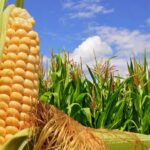
Is Our Phosphorus Use Sustainable? Most Stakeholders Doubt It
Matt Shipman and Khara Grieger | A new study finds that most phosphorus stakeholders – representing a wide swath of industry, agriculture, environmental and policy interests – have significant doubts about the long-term sustainability of existing phosphorus management systems. The study underscores the complex challenges facing policymakers and other decision-makers as they attempt to ensure our continued access to a critical resource that is finite and largely non-renewable....Continue reading "Is Our Phosphorus Use Sustainable? Most Stakeholders Doubt It"
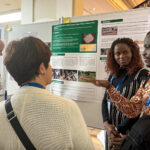
Blog: The Challenges of GMO Detection and Traceability in a Globalized Food System
By Joseph Opoku Gakpo and Modesta Abugu | The traceability and detection of biotech foods in a globalized system remain crucial, and while detection methods have improved, many challenges remain, especially for products of new genomic methods like CRISPR....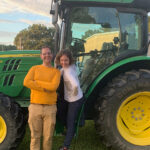
Blog: Impressions from the field: biotechnology, scale, and change
By Asa Budnick and Jill Furgurson | Over the summer of 2022, the last cohort of AgBioFEWS graduate students conducted field research in eastern North Carolina, gaining insights into the intersection of biotechnology, farm size, and environmental shifts on farmers....Continue reading "Blog: Impressions from the field: biotechnology, scale, and change"
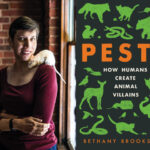
Why do we love cats and hate rats?
By NC State Libraries News | Why do we dote on parakeets but not pigeons? Why do we let cats curl up on our laps but catch rats in traps? Science writer Bethany Brookshire, author of the new book Pests: How Humans Create Animal Villians visits NC State on April 4th....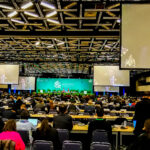
Blog: Reflections on COP15
GES members attended the recent UN biodiversity conference to better understand the impacts of biotechnology on biodiversity and conservation....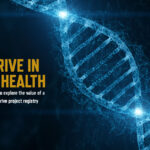
Experts from 14 Nations Discuss Global Gene Drive Project Registry
By Yadira Galindo | UC San Diego Herbert Wertheim School of Public Health and Human Longevity Science led 70 participants from 14 nations, including several GES Center faculty, in a discussion on the ways in which a gene drive project registry could both contribute to and detract from the fair development, testing and use of gene-drive modified organisms...Continue reading "Experts from 14 Nations Discuss Global Gene Drive Project Registry"
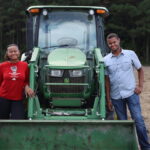
Tradition Meets Innovation
By Kristen Sargent | Fueled by their father’s passion for agriculture, Ruthie and DJ Stokes are keeping a family promise: do what you love. The fourth-generation farmers have found common ground in supporting producers back home and feeding a growing population....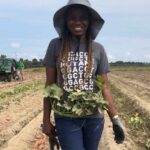
Modesta Abugu: Improving Sweetpotato Flavor for Nutrition Security
By Brandon Hopper | Ph.D. student Modesta Abugu is researching flavor compounds in sweetpotatoes with a goal of increasing consumption and improving global nutrition security....Continue reading "Modesta Abugu: Improving Sweetpotato Flavor for Nutrition Security"
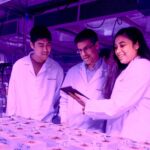
Blog: Archea, Microbial Superheroes?
Jabeen Ahmad, September 27, 2022 | Food insecurity is a concern now and in the future. Globally, the United Nations estimates that about 690 million people are food insecure. By the year 2050, the world population is expected to reach nine billion people, requiring food supplies to double. ...
NC State part of $26 million grant to study microbiomes
Heidi Reid, September 7, 2022 | NC State is taking part in the National Science Foundation Engineering Research Center for Precision Microbiome Engineering (PreMiEr) to research genetically engineered microbiomes. ...Continue reading "NC State part of $26 million grant to study microbiomes"

Exploring the Social, Ethical Sides of Microbiome Engineering
Nash Dunn, September 7, 2022 | At NSF center, NC State to Lead Research on Societal and Ethical Implications of Emerging Technologies...Continue reading "Exploring the Social, Ethical Sides of Microbiome Engineering"

Researchers Propose New Framework for Regulating Engineered Crops
Mick Kulikoswki, September 1, 2022 | A Policy Forum article published today in Science calls for a new approach to regulating genetically engineered (GE) crops, arguing that current approaches for triggering safety testing vary dramatically among countries and generally lack scientific merit – particularly as advances in crop breeding have blurred the lines between conventional breeding and genetic engineering....Continue reading "Researchers Propose New Framework for Regulating Engineered Crops"

NC State to Research Implications of Engineered Microbiomes with New NSF Center Grant
Deborah Strange, August 10, 2022 | NC State University is part of a five-year, $26 million National Science Foundation center researching microbiome engineering....
NC State Brings Expertise, Interdisciplinarity to Galapagos Consortium
Deborah Strange, July 29, 2022 | In joining the International Galapagos Science Consortium, NC State bolsters its current research and service on the archipelago....Continue reading "NC State Brings Expertise, Interdisciplinarity to Galapagos Consortium"
